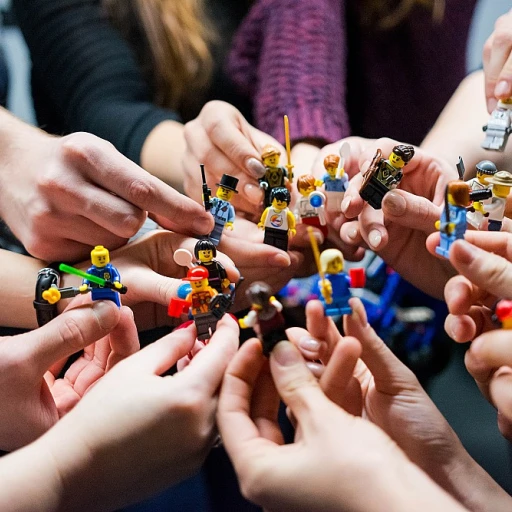Understanding Inclusive Mentoring Initiatives
The Core of Inclusive Mentoring: Bridging Diverse Worlds
Inclusive mentoring initiatives are all about fostering connections between individuals of diverse backgrounds and experiences. These programs aren't just focused on professional growth, but also on bringing equity and inclusion to the workplace, opening doors for diverse talent. Think of them as bridges connecting mentors and mentees, aiming for a shared path of learning and support. Mentors from varied cultural, racial, or ethnic backgrounds provide their unique perspectives, offering a rich tapestry of experiences. This collaboration allows both mentors and mentees to broaden their horizons and embrace a more open-minded approach in their careers. The beauty of inclusive mentoring lies in its power to spotlight social justice and racial equity issues. It's a chance for employees to learn from one another and grow beyond their existing knowledge. This collaboration can help mentees, whether they're in medical school or on their first job, develop the skills necessary for navigating the professional world. So, why is diversity mentoring crucial? It's because when we bring together individuals with different experiences and views, we ignite creativity and innovation. Diverse mentorship programs aren't just beneficial for employees; they strengthen the organization as a whole. By paving the way for inclusive growth, such initiatives ensure that everyone, regardless of background, has a fair chance to succeed. Inclusive mentoring often starts with recognition. These programs aim to recognize the unique challenges and barriers faced by underrepresented groups in professional settings and provide them with meaningful support. To explore more about peer-to-peer mentoring and its benefits, check out how it challenges norms in the workplace.The Impact of Diversity on Professional Growth
The Role of Diversity in Professional Growth
Diversity isn't just a buzzword; it's a game-changer in the workplace. When you bring together people from different backgrounds, you spark innovation and creativity. Diverse teams are more likely to come up with fresh ideas and solutions because they draw from a wide range of experiences and perspectives.
But how does this translate to professional growth? Well, employees who are part of diverse teams often find themselves learning more and developing faster. Exposure to different viewpoints and problem-solving approaches can accelerate career development. For mentors, guiding someone from a different background can enhance their leadership skills and broaden their understanding of diverse talent.
Mentorship as a Catalyst for Inclusion
Mentorship programs that emphasize diversity and inclusion help create a sense of belonging among employees. When mentors and mentees from diverse backgrounds work together, they build bridges of understanding and empathy. This not only benefits the individuals involved but also fosters a more inclusive workplace culture.
Consider the story of a young employee from a minority background who, through a mentorship program, connected with a senior leader in the organization. This relationship provided invaluable support, guidance, and opportunities for growth, showcasing the power of diversity mentoring. Such stories highlight the positive impact of mentorship on both personal and professional levels.
Breaking Down Barriers with Diversity Mentorship
Diversity mentorship programs can break down barriers that often hinder the progress of individuals from underrepresented groups. By providing access to networks, resources, and opportunities, these programs help level the playing field. They also promote equity and inclusion, ensuring that everyone has a fair chance to succeed.
For organizations, investing in diversity mentorship is not just the right thing to do; it's a smart business move. Diverse teams are more innovative and better equipped to meet the challenges of a rapidly changing world. By supporting diversity mentoring, companies can tap into a wider pool of talent and drive their success forward.
To learn more about how mentorship can build professional networks and support diverse talent, check out this resource on building professional networks through mentorship.
Key Components of Successful Mentoring Programs
Building Bridges through Diversity in Mentorship
When you mix things up with diverse mentors and mentees, you're not just mixing up who gets a shot at success – you're mixing up the ideas, perspectives, and experiences that fuel creativity. This is what diversity in mentoring programs is all about. So, let’s look at what makes mentorship shine:- Dedicated Mentors and Passionate Mentees: The heart of any great mentoring program is the people. Finding mentors who are not only experienced but also passionate about guiding others is crucial. Equally important are the mentees – those eager to learn and willing to be open to different perspectives. This creates a mentoring relationship where both parties grow and learn.
- Comprehensive Training and Support: It's not just about pairing up employees and hoping for the best. Effective mentoring programs provide training that helps both mentors and mentees understand what’s expected and how to maximize their time together. This usually includes education on topics like diversity, inclusion, and social justice, ensuring everyone is on the same page about fostering an inclusive environment.
- Structured yet Flexible Programs: Building a mentoring relationship doesn’t happen overnight. Successful programs provide structure – like setting goals and milestones – but allow flexibility so that both mentors and mentees can adjust as the relationship develops. This adaptability is particularly important when working with diverse talent from varied backgrounds.
- Opportunities for Inclusive Feedback: Feedback is a two-way street. Programs that encourage honest, constructive feedback from both sides create a transparent and open mentoring environment. It builds trust and helps improve the program as it evolves.
- Cultural Competency Training: One of the most important things in diversity mentoring is ensuring mentors are equipped to understand and navigate the cultural nuances that come with a diverse pool of mentees. It’s about creating a space where every employee feels valued and respected.
Challenges in Implementing Diversity Mentoring
Overcoming Barriers to Diversity Mentoring
Creating a mentoring program that embraces diversity is no small feat. While the benefits of inclusive mentoring are clear, the path to implementation is often riddled with challenges. One major hurdle is the unconscious bias that can seep into the selection process of both mentors and mentees. Organizations must actively work to recognize and mitigate these biases to ensure a truly inclusive environment.
Another obstacle is the lack of diverse mentors. Many organizations find it difficult to match mentees from diverse backgrounds with mentors who have similar experiences. This gap can hinder the effectiveness of the mentorship relationship, as shared experiences often enhance understanding and support. To bridge this gap, companies can invest in training programs that prepare employees from diverse backgrounds to take on mentoring roles.
Building a Culture of Inclusion
For diversity mentoring to thrive, there needs to be a culture of inclusion within the organization. This means fostering an environment where all employees feel valued and supported. Leadership plays a critical role here; they must champion diversity and inclusion initiatives and lead by example. When leaders prioritize diversity, it sends a strong message that inclusion is a core value of the organization.
Additionally, providing ongoing support and resources for mentors and mentees is essential. Regular check-ins, feedback sessions, and access to resources can help sustain the mentoring relationship. Organizations should also encourage open dialogues about diversity, equity, and inclusion to promote awareness and understanding among all employees.
Addressing Systemic Issues
Systemic barriers, such as racial and gender inequities, can also impede the success of diversity mentoring programs. Addressing these issues requires a commitment to social and racial justice at all levels of the organization. Companies should implement policies that promote equity and inclusion, ensuring that diverse talent is not only recruited but also retained and advanced within the organization.
Finally, organizations must be willing to adapt and evolve their mentoring programs based on feedback and changing needs. By continuously assessing the effectiveness of their initiatives, companies can make necessary adjustments to better support their diverse employees.
Diversity mentoring is a powerful tool for career development, but it requires a concerted effort from everyone involved. By recognizing and addressing the challenges, organizations can create mentorship programs that truly make a difference.
Real-Life Success Stories
Success Stories That Inspire
Stories of triumph through mentoring programs are not just heartwarming; they are a testament to the power of diversity and inclusion in shaping professional journeys. These narratives show how mentors and mentees from diverse backgrounds can come together to foster growth and success.
Consider the experience of Sarah, a young woman from a minority background who entered the tech industry with dreams but faced numerous hurdles. Through a diversity mentoring program at her organization, she connected with a mentor who had once walked a similar path. This mentor provided guidance, support, and the encouragement Sarah needed to navigate her challenges. Today, Sarah is not only a successful software engineer but also a mentor herself, giving back to the community that supported her.
The Impact of Mentorship on Career Development
Another inspiring story comes from a mentorship program within a medical school. Dr. James, a mentor with decades of experience, partnered with Maria, a first-generation college student. Their mentoring relationship was built on mutual respect and shared goals for equity and inclusion. Maria credits her mentor's unwavering support and practical advice for her successful transition from medical school to a thriving career in healthcare. Their story highlights how mentorship can break barriers and open doors for diverse talent.
Mentoring in Action: Social and Racial Justice
Mentorship programs are also playing a crucial role in advancing social justice. In one organization focused on racial justice, mentors and mentees work together to address systemic issues and promote change. These programs not only provide personal and professional growth opportunities but also empower employees to become advocates for equity and inclusion in their communities.
Such stories underscore the importance of inclusive mentoring initiatives in fostering a supportive environment where diverse talent can thrive. They remind us that with the right mentorship, employees from all walks of life can achieve their fullest potential.










